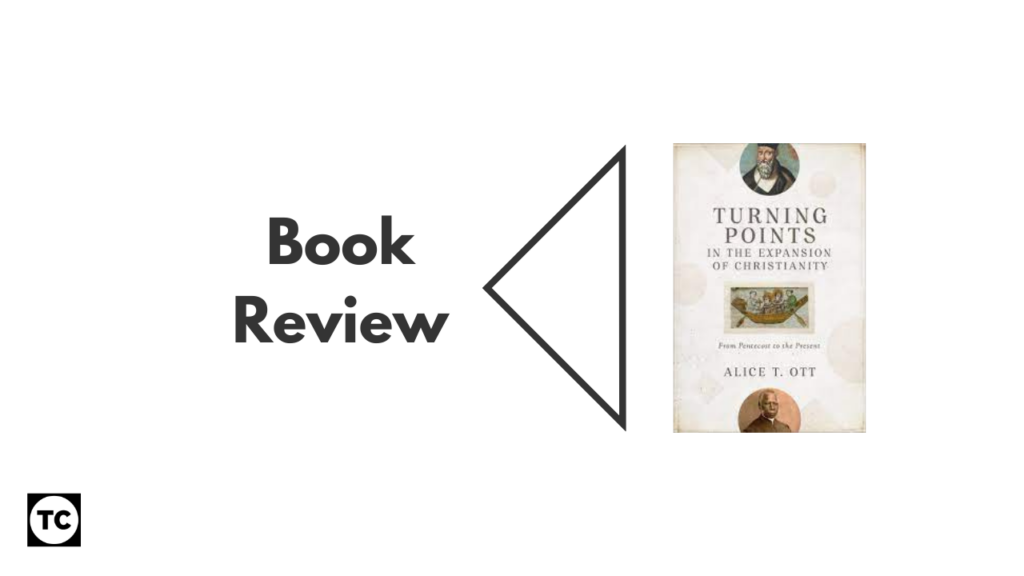
My first degree was technically in ‘theology and religious studies’, my second technically in ‘mission and ministry’, and all four aspects of those two courses have value (even if I do think theology proper is probably the one I’d want to have focused solely on, had I a time again). So it was with some delight that as I read Ott’s Turning Points in the Expansion of Christianity: From Pentecost to the Present (Baker Academic, 2021) I saw threads of those four different aspects of study coming together. This is ostensibly a book on what some would call ‘mission’ (Ott prefers the word ‘expansion’, for reasons I think are very reasonable, particularly in the academy), and is also a particular approach to the study of the history of the global church (Which, of course, is arguably a history of the study of mission!).
Part of the genius of this book is that it doesnt’ slavishly walk slowly through every possible event (exhaustive history has it’s place, of course), but rather picks twelve moments or movements that have been important – from the Jerusalem Council in AD 49, through Boniface and the oak of Thor in AD 723 (this being particularly interesting to me as someone interested in discussion of power both human and divine – “no mention is made of the dramatic power encounter as the cause of conversion; the focus is on preaching” [p. 83] – in a contemporary letter about the event); through to the complex links between ‘British Abolitionism and Mission to Africa’ in 1807 and Empowering Indigenous Churches in 1841, to the crescendo of The Edinburgh World Missionary Conference of 1970 and the Lausanne 1974 congress.
Two things particularly struck me as important themes from this book – which I would recommend to anyone thinking or studying ‘theology/religions studies/mission/ministry’ and related topics. First of these was the complexity of global mission. In her chapter ‘Pioneering a Global Outreach: Zinzendorf and Moravian Missions’ Ott observes that “one should not maintain too sharp a division between home and foreign mission, or between mission among nominal Christians and mission among non-Christians” (p.113). This is particularly pertinent in Western contexts like the UK and USA, where nominal Christians are probably a larger demographic than those of other religions, including Atheism. In another boundary-blurring and dichotomy-defying observation, in the chapter on ‘British Abolitionism and Mission to Africa’ Ott notes that “It was only as British evangelicals became involved in the abolitionist movement that their concern for their concern for the eternal fate of Africans deepened and that Africa came on their radar screen as a potenal venue for missionary activity” (p. 162). This is just one example of different strands of the mission and kingdom of God going hand in hand in ways that may not be clear cut – and this leads to the second important theme.
As Ott puts it in her conclusion, “Theology matters. The degree to which the various branches of the church in a particular time and place put into practice the universal mission mandate was in part dependent on their theology of mission” (p.270). This is picked up gently throughout the book, regardless of which moment or movement is in view, and sewn together explicitly at the end. This is refreshing – it seems to me that sometimes mission thinking can be less theological than it could be – and that what can pass for missiological or other forms of allegedly-theological thinking around the church and the academy could do with being more unabashedly ‘theological’ – whatever the issue at hand is. For example, the quote above comes from (to put it bluntly and simply) the Clapham sect coming to believe theologically that Africans being sold into slavery were human as they were, made in the image of God (A theological position) leading to a missional impulse (the mission/ministry outcome).
Readers can probably tell that I thoroughly enjoyed and appreciated this book. Ott is a calm and capable storyteller – sewing together sources and narrative in a clear and competent way, which makes her prose a pleasure to read, even if it sometimes feels a little detached. That doesn’t detract, however, from what is an academic book. I’d recommend it to those involved in theological and religious studies, to those training for a life of mission and ministry, and to armchair theologians and missiologists like myself, particularly keen to think through difficult issues and find out more about lesser-known missionary movements and moments.
5/5
If this has whet your appetite, the following may also be of interest:
- Ashford and Thomas’s The Gospel of Our King – a shorter book that fleshes out mission in a theological way.
- John Valentine’s Jesus, the Church and the Mission of God: A Biblical Theology of Church Planting – a book I edited.
- Mark Crosby’s So Everyone Can Hear – an engaging practical book about church communications, a vital part of mission today.
Leave a Reply